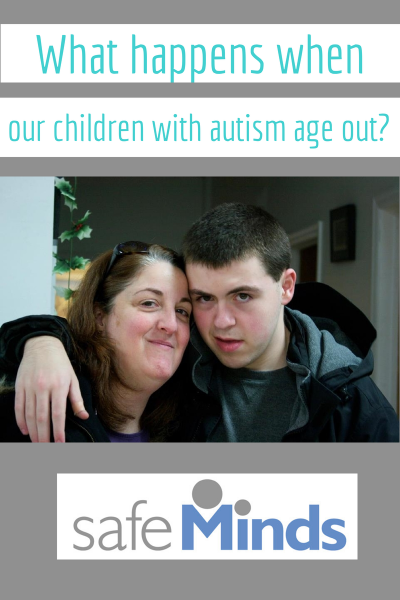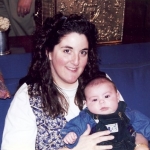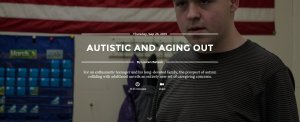By Heidi Roger, SafeMinds Board Member
This time of year is very hard.
My friends and colleagues are all attending high school graduations, going to graduation parties, and talking about what colleges their kids got accepted to.
My son Andrew is not going to college.
Andrew is 19 years old but he does not have a driver’s license, he has never had a girlfriend, he has not learned to shave himself. I have to help him wash his hair when he takes a shower.
Your friends talk about the milestones, rites of passage, and new opportunities for their kids. You nod and smile even though your stomach gets a knot in it, not because you aren’t happy for your friends—you are—just because you had so many hopes and dreams for your own child too.
Jennifer and I talked on the phone every day. Her husband barbequed the best ribs in the state of New Jersey. Their daughter was born four months before Andrew and we were deliriously hopeful together. Jennifer had another child, Avery, a year after Andrew was born. Andrew was 27 months old when he was diagnosed with autism. I hit the ground running trying to help him, researching treatments, finding other parents to talk to , fighting—I mean advocating—for his education with our ill-informed school district.
When Andrew was five, we went to Jennifer’s house for a visit. Andrew walked around the room looking at colorful things that caught his eye. Avery was only four years old, he grabbed Andrew’s Magna Doodle and made a beautiful drawing of a flower : “Look, Mommy, look what I drew!” Avery was being four —a typical four —that’s all, but I couldn’t breathe. My heart was broken in a thousand pieces.
I don’t wish anything bad against people with typical kids. They just have no idea. They don’t understand what parents with children with autism go though. Of course we love our kids as much as they love theirs. But we hoped for something better for them.
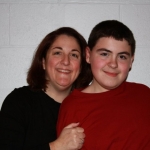 In some ways I’m lucky. My son is not violent. While some people affected by autism are non-verbal, Andrew can communicate, as you’ll see in the video. If he points to a place on his body and says “red,” that means it is hurting him. Although he is adult age he still has a childlike love for his mother. He trusts me completely. He and I are very close and I’m grateful for that. It’s a blessing.
In some ways I’m lucky. My son is not violent. While some people affected by autism are non-verbal, Andrew can communicate, as you’ll see in the video. If he points to a place on his body and says “red,” that means it is hurting him. Although he is adult age he still has a childlike love for his mother. He trusts me completely. He and I are very close and I’m grateful for that. It’s a blessing.
But I’m also worried. What does Andrew’s future hold?
Andrew has two more years of high school left. As part of a work program through his school, he helps with filing, shredding, and data entry at the principal’s office. He puts silverware in the containers at the cafeteria and condiments on the table. Andrew can also use a computer. He loves Sesame Street, Winnie the Pooh, and Nickelodeon cartoons. He collects VHS tapes.
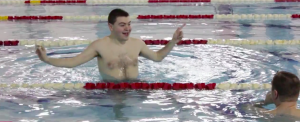
How will we teach him enough skills to get a job?
I’m not thinking about finding him a place to live apart from me. But I’m a single mom with a full-time job that supports us. When you work full-time it’s hard to get the dominoes lined up. Every parent with a severely autistic child like mine who is aging out of public education has a similar concern: these kids need to have a place to go after they turn 21.
If something happens to me, or when I get too old to take care of him, what will happen to Andrew? It’s overwhelming to try to plan for his future, to worry that eventually there will be no one to watch him, to wonder what will happen to my sweet boy when I’m no longer here…
That’s why we do what we do at SafeMinds, working to protect every child’s brain from the environmental pollution that can trigger autism. That’s why we want to educate and empower you about how to have a healthy pregnancy, the safest amounts of fish to eat, and why we need more unbiased medical research.
We don’t want one more child to have to go through these difficulties.
This year, in 2014, over 50,000 autistic young people aged out of public school.
We need a plan for them.
We need a plan for Andrew.
Do you have a child with autism? Are you wondering what will happen to him or her? We love reading your comments and we appreciate your thoughts and advice.
Heidi Roger is the Vice President of Financial Operations at Barney’s New York and a founding member and treasurer of SafeMinds. She sometimes wishes she had chosen to be a stand up comedian instead of a financial professional.
Andrew is in this 13-minute video about autism and aging out, which also features Temple Grandin and an 89-year-old mom who is still taking care of her 70-year-old son. Whether you have a child on the spectrum, we all need to know about the scope of this problem: http://narrative.ly/tough-medicine/autistic-and-aging-out/

